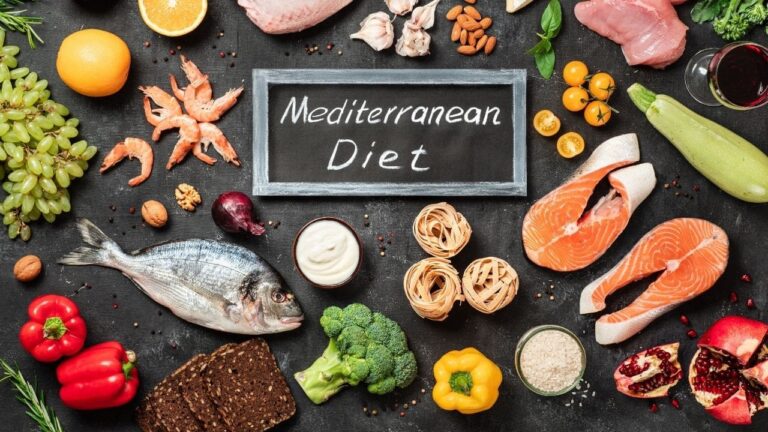MEDITERRANEAN DIET

“The study found that a Mediterranean healthy diet in olive oil or nuts would decrease the likelihood of stroke, heart failure and heart disease mortality in 3 combination”
Mediterranean diet food gained popularity in the 1960s due to an observation that concluded that those who lived in the Mediterranean countries and adhered to their meal plan had fewer coronary heart disease than their American counterparts who did not follow the Mediterranean diet plan. To benefit from this healthy eating plan, nutritionists and dietitians have developed a Mediterranean diet 7-day meal plan. Mediterranean diet is praised for its ability to prevent chronic heart diseases, stroke, type 2 diabetes and help in weight loss.
There is no single, strict way of following the Mediterranean diet since every country in the region has different food inclusions in the diet plan.
According to studies, this guideline is a dietary pattern suggesting that the Mediterranean way is a healthy way of eating.
The Basics of Mediterranean Diet Foods
The foods in this dietary guideline are depended on the traditional foods for countries that border the Mediterranean Sea. The diet is majorly high in vegetables, whole grains, fruits, olive oil, beans, seeds, and nuts.
Protein components such as poultry, eggs, beans, and fish are taken every week. An intake of limited dairy products and red meat. Another basic component of this diet involves food sharing with family and friends, staying active, and enjoying a glass of wine. Sweetened beverages, refined oils, processed grains, and other processed foods are highly discouraged in this diet plan.
There is controversy about which food to include in the diet due to the diversity of countries in this region. However, several studies agree that the diet is composed of healthy plant foods and limited animal foods. Fish-eating and seafood are encouraged at least twice weekly. The foods include:
Comprising kale, broccoli, onions, tomatoes, cucumbers, Brussels sprouts, and cauliflower.
Unlike the keto diet, the Mediterranean diet encourages eating fruits such as apples, bananas, dates, grapes, melons, mangoes, and figs.
Including walnuts, macadamia nuts, cashew, sunflower seeds, flax seeds, and pumpkin seeds.
These comprise lentils, beans, chickpeas, peanuts, and peas.
This category has sweet and Irish potatoes, yams, and turnips..
Including brown rice, corn, whole oats, buckwheat, whole wheat, and whole pasta.
They include, tuna, shrimp, salmon, oysters, sardines, crabs, mackerel, and trout.
They consist, chicken, turkey, duck, and their eggs.
Consumed in moderation, including sugar-free yogurt, and cheese
Such as basil, mint, garlic, sage, rosemary, cinnamon, and pepper also form part of this healthy diet. Since processed oils and fats are not welcomed, this diet plan recommends extra virgin oil, avocado oils, and olive oil.
MEDITERRANEAN DIET-RELATED FOODS
The Mediterranean diet frequently includes almonds, onions, citrus fruits, vegetables, seeds, and whole grains. These medicinal concoctions are used to prepare meals. Reasonable quantities of meat, meat, and chickens, as well as seafood, are popular components of the Mediterranean diet. In comparison, red meat is consumed on a rare occurrence.
The Mediterranean diet is focused on healthy fats. They are ingested instead of less desirable fats, such as saturated fat, that cause heart disease to develop. Olive oil is the key ingredient of the Mediterranean diet’s added fat. Total levels of cholesterol and low density of lipoprotein with monounsaturated fats in olive oil have been decreased. Sometimes, noodles and seeds produce monounsaturated fat.
THE BENEFITS OF A MEDITERRANEAN DIET
The Mediterranean diet tends to be an advantageous way to avoid or manage heart failure, type 2 diabetes, as well as other risks. Additionally, it can aid in weight loss. PREDIMED was designed to explore the meddiet’s long-term effect on core cardiac attack prevention in high-risk individuals.
The diet’s possible impact on cardiac disease, stroke, and demise from coronary causes was the primary concern.
The primary and secondary outcome variables are a variety of adverse events, comprising non-fatal myocardial infarction, non-fatal stroke, and cardiac attack mortality. The 7477 participants in the PREDIMED study were randomly allocated to one of three diets: MedDiet with extra virgin olive oil (EVOO), Med Diet with mixed nuts, or the control diet. EVOO and nuts were provided free, and non-food prizes were offered to test participants to promote enforcement during the experiment It found that the probability of cardiac attack, stroke and heart disease death was minimized by 31% and 28%, respectively, in the Med + Olive Oil and Med + Nuts groups. Additionally, the report noted that no clinically meaningful variations in cardiac disease or stroke occurred between the diets. Individuals with hypertension, lipid complications, or obesity reacted more favorably to the Mediterranean diet than to the control diet. Additionally, the report found no statistically important difference in total mortality, which is the probability of dying from some cause.
WEIGHT LOSS AND MAINTENANCE CAN BE FACILITATED BY THE MEDITERRANEAN DIET
Although the Mediterranean diet, with its emphasis on whole, fresh foods, is likely to aid in weight loss in a healthy and sustainable manner, those seeking quick results growing be best off with a different diet plan. According to a report published in August 2016 in the journal The Lancet: Diabetes and Endocrinology, consuming a calorie-restricted Mediterranean diet high in unsaturated vegetable fat culminated in somewhat more weight loss and a reduced waist circumference over a five-year span.
CONSUMING A MEDITERRANEAN DIET CAN ASSIST IN PREVENTING AND MANAGING TYPE 2 DIABETES
RHEUMATOID ARTHRITIS PATIENTS MIGHT BENEFIT FROM A MEDITERRANEAN DIET
CONSUMING FOODS FROM A MEDITERRANEAN DIET CAN ASSIST IN THE TREATMENT OF DEPRESSION
According to a retrospective analysis published in the publication Molecular Psychiatry in September 2018, Mediterranean diet has a lower incidence of depression. Combined data from quarter longitudinal experiments found that the diet was linked to a 33 percent lower risk of depression compared to the pro-inflammatory diet of a more conventional American diet. “Although the research did not explain why a Mediterranean diet reduced the likelihood of depression, the authors stated that their findings may serve as a springboard for developing and studying diet-based treatments for depression.
ADHERING TO A MEDITERRANEAN DIET ENTAILS MAKING LONG-TERM, HEALTHY IMPROVEMENTS TO ONE’S DIET
In general, a person should strive for a diet rich in natural foods, such although plenty of vegetables, whole grains, and healthy fats. Anyone who may not feel satisfied with their diet should see a dietitian. They will make recommendations for additional or substitute items that will aid in increasing satiety.
ADVERSE EFFECTS OF MEDITERRANEAN
Certain people may experience health issues as a result of this eating style, such as:
- Consuming fats such as olive oil and nuts may result in weight gain.
- This might lead to low levels of iron. If you choose the Mediterranean diet, incorporate iron or vitamin C rich food that lets the body absorb iron.
- Calcium deficiency can exist because less milk products are consumed. One should consult the doctor about taking a calcium supplement.
- While wine is an integral foodstuff, others may refrain from alcohol. Limit wine if you might be vulnerable to substance addiction, breastfeeding, breast cancer danger or have other drinking medical conditions.
MEDITERRANEAN DIET 101: A MEAL PLAN AND BEGINNER’S GUIDE
Building A Mediterranean Diet 7-Day Meal Plan
Since the Mediterranean diet emphasizes plant food, it is sometimes possible to have only vegetables, legumes, and whole-grain take up all the meals for the day. The foods are cooked with healthy fats, oils, and spices. On occasion, the meals have fish, eggs, and small portions of meat. Clean drinking water and moderate wine are also part of the meal plan.
Here is a beginner’s guide example for a 7-day meal plan:
Day 1
Breakfast
One pan of fried egg, a toast from whole-wheat flour, grilled tomatoes, and a slice of avocado to accompany the toast.
Lunch
2 cups of chopped salad greens coupled with tomatoes and a slight dressing of vinegar and olive oil. In addition, whole grain bread and 2ounces of hummus to add to the fiber content.
Dinner
A combo of whole-grain pizza topped with low-fat cheese and grilled veggies. You could consider adding some shredded chicken or fish.
Day 2
Breakfast
A cup of plain Greek yogurt, half a cup of fruits comprising chopped nectarines, raspberries, and blueberries. Adding a few nuts could help add to the calories.
Lunch
A whole-grain sandwich spread with avocado then filled with grilled vegetables of your choice. Dinner Baked cod or salmon topped with black pepper or ground garlic and roasted potato dipped in olive oil or chives.
Day 3
Breakfast
1 cup of whole-grain oat after pouring some honey, cinnamon, and dates on it. One could choose to add lower sugar fruits and some almond nuts.
Lunch
Boiled beans that have additive spices such as cumin and garlic. In addition, 1 cup of arugula dressed with olive oil and topped with slices of tomatoes and cucumber.
Dinner
A half a cup of pasta, whole-grain, sugar-free tomato sauce, grilled vegetables, and olive oil, sprinkled with parmesan cheese.
Day 4
Breakfast
A combination of scrambled eggs and onions, tomatoes, and bell peppers topped with a quarter piece of avocado.
Lunch
Whole-grain toast combined with roasted anchovies and sprinkled with lemon juice. One could combine it with two cups of steamed kale and
pieces of tomatoes.
Dinner
Boiled artichoke with added salt, olive oil, and garlic powder besides 2 cups of lightly steamed spinach and herbs.
Day 5
Breakfast
A cup of cinnamon Greek yogurt topped with honey plus a mixture of shredded almonds and apple.
Lunch
A cup of quinoa mixed with sun-dried tomatoes, olives, and bell peppers. A combination of oregano, thyme, and roasted garbanzo topped with feta cheese or avocado.
Dinner
A regular 2 cup of steamed kale coupled with cucumber, tomato, lemon juice, and olives. One could also add a piece of grilled sardines sprinkled
with lemon.
Day 6
Breakfast
Two pieces of whole-grain toast with a soft cheese of your choice in addition to chopped figs or blueberries.
Lunch
Two cup mixture of leafy greens, cucumber, and tomato. A piece of roasted chicken sprinkled with lemon juice and olive oil.
Dinner
Roasted vegetables, preferably oven-roasted, such as zucchini, carrot, artichoke, eggplant, and tomato. One cup of whole-grain couscous coupled with a roasted toss that is dipped in olive oil and herbs.
Day 7
Breakfast
A mixture of cinnamon oats, maple syrup, and date topped with low-sugar fruits.
Lunch
A stew of zucchini, onions, yellow squash, which could be eaten together with potato in herb or tomato sauce
Dinner
Two cups of greens could be spinach or arugula combined olive oil, tomato, and olives. One could include a piece of white fish and the vegetable stew from lunch to add to the calories.
Mediterranean Snacks
Suitable snacks that suit this diet include limited servings of nuts, dried figs, whole fruits such as oranges. It could also entail a small serving of yogurt, hummus coupled with carrots, whole-grain toast buttered with avocado.
The Bottom Line
Though there is no single way to define a Mediterranean meal, it is considered healthy due to its rich plant foods with limited animal foods. Flesh that is mostly included in this diet is fish and seafood. The internet is abuzz with information about the Mediterranean diet, and you can make a recipe from this information.
ABOUT THE AUTHOR
TATYANA DYACHENKO
Tatyana is a part-time sex, health and CBD blogger with a handful of magazines and blogs. Tatyana has been featured in magazines such as Cosmopolitan, Teen Vogue. Vice, Tatler, Vanity Fair and many others. Tatyana enjoys pursuing her flare for creativity through modelling, graffiti art, astronomy and technology. She also enjoy cycling across London on an iconic Boris bike that has come to define London. You are most likely to bump into Tanya in Brick Lane or Camden Town where she enjoys spending most of her time.




